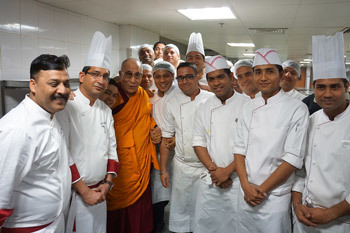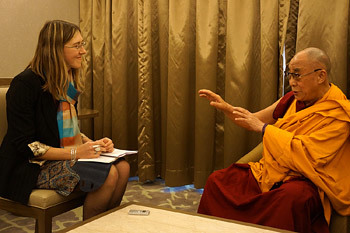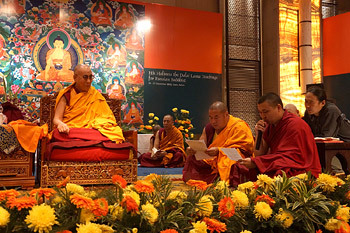New Delhi, India, 25 December 2012 - Although the weather outside in Delhi today was misty and cold, when His Holiness the Dalai Lama reached the large hall of the Kempinski Ambience Hotel, he was greeted by hundreds of smiling faces. He began his talk in a characteristic down to earth way:
“I have no blessings to give; I don’t think of myself as the Dalai Lama, but as another person like everyone else. The important thing is that we want to lead a happy life and to do that we need to educate ourselves.”
He said that of the miracles the Buddha revealed through the actions of his body, speech and mind, it was through his speech that he taught the difference between the paths of right and wrong. He showed how to find happiness and overcome suffering. The suffering we don’t want and the happiness we do both arise from causes. Suffering comes about principally because of our ignorance. Although we seek happiness, because of ignorance we tend to create the causes of suffering. So, we need to know what brings us happiness and what gives rise to suffering. The Tibetan master Je Tsongkhapa said of the Buddha, “Of all your enlightened deeds, your speech is supreme; therefore the wise remember you for your teaching.”
His Holiness explained that we cause ourselves suffering by clinging to the appearance of things. What we need is to see how things really are. To do this we need to use our intelligence to the utmost. We need to study, learn and overcome the ignorance within us. Remarking that he won’t be able to teach the entire book on this occasion he said,
“You have the book, read it, make yourselves familiar with it, and go over it again and again until the pages become blackened with use.”
Shantideva, the author, did not write the book for mere entertainment. The contents concern what the Buddha taught and the later commentaries of subsequent teachers. He states that he composed it to acquaint them to his own mind. His Holiness said it takes intelligence to see what the book says and persistence to understand it. He again quoted Je Tsongkhapa: “Therefore the wise who have an intention to practise train their minds with intelligence.” What this implies is that we should reflect on the teaching, not just repeating it to ourselves, but questioning it, checking what the text says against our own experience and comparing what we discover with what others have to say. In the end this will bring us to the importance of cultivating a warm heart.
In Tibetan the word for meditation has the connotation of making ourselves familiar with the teaching and the paths it delineates. His Holiness compared it to training a pilot.
“When you first look into the cockpit you feel bewildered and lost, but ultimately, through training and familiarity you master what needs to be done. You have to be able to use your intelligence.”
Turning from the first chapter to the ninth, he read,
“All these practices were taught by the mighty one for the sake of wisdom”
 |
His Holiness the Dalai Lama with kitchen staff of the Kempinski Hotel, venue for his four day teaching to Russian Buddhists in Delhi, India, on December 25, 2012. Photo/Jeremy Russell/OHHDL
|
Because of ignorance we need to develop wisdom within; we need to understand how things really are. Education is important because it is how we acquire knowledge. In this case we need to overcome ignorance about causality and how things really are. Everyone who wishes to pacify suffering should develop wisdom. Chapter nine mentions that there are two kinds of people: the ordinary and the yogis. The Tibetan term for yogis consists of two parts, one that implies the correct meaning and the other that suggests connecting with it. So, yogis are those who connect with the correct meaning. His Holiness drew a comparison between ordinary people today, who are not analytical and who enjoy what they see or listen to, and scientists who are not content inasmuch as they constantly seek to understand reality.
Back in chapter one, the advantages of the altruistic intention, the awakening mind of bodhichitta are being explored: “Aspiring to freedom and to leading others to freedom counters the causes for lower rebirth. All purposes whether temporary or ultimate can be fulfilled through the awakening mind of bodhichitta. Thus, I pay homage to bodhichitta.”
His Holiness quoted the nineteenth century adept, Shakya Shri:
“When I am joyful, I dedicate all my merit to others; when I am unhappy I take on the suffering of all sentient beings, and through that merit may the ocean of suffering dry up.”
Identifying the nature of the awakening mind of bodhichitta in the Ornament for Clear Realization Maitreya says: “It is the perfect wish to reach Buddhahood for the benefit of all sentient beings. When you cultivate bodhichitta, you first develop compassion, the wish to liberate others from suffering, on the basis of which you develop an intention to become a Buddha.”
The awakening mind is twofold: aspiring to awaken and venturing to do so. It is like the wish to go and actually going. You have a destination in mind and an intention to go there; then you actually set out.
His Holiness said that he would lead a ceremony to generate the aspiring awakening mind tomorrow in conjunction with giving the permission of the Medicine Buddha.

|
Olga Lipich of Russian television interviewing His Holiness the Dalai Lama in Delhi, India, on December 25, 2012. Photo/Jeremy Russell/OHHDL
|
In between the morning and afternoon teaching sessions, His Holiness continued the interview begun yesterday with Russian television. The interviewer, Olga Lipich, asked the difference between love and compassion and attachment. He told her that our sense of attachment tends to depend on other people’s response to us and on whether we consider them friendly or hostile. Instead of this kind of bias, he recommended that we should develop a sense of concern on the basis of belonging to the same human family. We should think, “These people are like me, they want happiness and dislike suffering.”
Asked his opinion of the fate of the musicians known as Pussy Riot, His Holiness raised his hands saying it was too sensitive for him to comment and anyway he didn’t really know anything about it. He teasingly added,
“If you want me to comment, let me come to Moscow and find out.”
This prompted the interviewer to say that many of the people attending the teaching looked forward to his coming to Russia and asked when that might be. His Holiness replied,
“I came to Russia in 1979 and 1982, when it was still part of the USSR and it seems ironic that I was able to come when it was still a totalitarian communist state, but now that it’s free, it seems I can’t. Generations of Russian Buddhists have had a unique relationship with the Dalai Lamas and with Tibetans, so a historical link exists. I am naturally concerned about their well being and indeed for the Russian Federation as a whole. My predecessor, the 13th Dalai Lama, had a connection with and concern for Russia. I also have many Russian friends who are not Buddhists.”
Laughing, he concluded,
“Whatever happens, I don’t want to put anyone to any inconvenience.”















